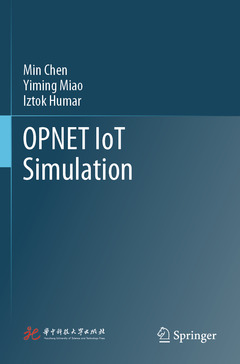OPNET IoT Simulation, 1st ed. 2019
Auteurs : Chen Min, Miao Yiming, Humar Iztok

This is the first book offering an in-depth and comprehensive IoT network simulation, supported by OPNET tool. Furthermore, the book presents the simulations of IoT in general, not limited by OPNET. The authors provide rich OPNET IoT simulation codes, with detailed explanation regarding the functionalities of the model. These codes can facilitate readers? fast implementation, and the shared model can guide readers through developing their own research.
This book addresses various versions of Internet of Things (IoT), including human-centric IoT, green IoT, Narrow band IoT, Smart IoT, IoT-Cloud integration. The introduced OPNET IoT simulation provides a comprehensive platform to simulate above-mentioned IoT systems. Besides, this book introduces OPNET semi-physical simulation in detail. Based on this technology, simulated IoT and practical cloud are seamlessly connected with each other. On top of this ?IoT-cloud-integration? semi-physical simulation environment, various smart IoT applications can be realized.
1.1 The development process of IOT (5)
1.2 Design concept of IOT (9)
1.3 Architecture and key technologies of IOT (12)
1.4 IOT and WSN、M2M、BAN、CPS (21)
1.5 Human beings IOT (27)
1.6 IOT and big data, cloud computing、SDN (45)
1.7 IOT and network simulation (53)
2 Introduction to OPNET network simulation (54)
2.1 OPNET overview (54)
2.2 Introduction to OPNET common functions (61)
2.3 Modeling and simulation methods for OPNET networks (77)
2.4 Processing of simulation results (89)
2.5 Packet switching network routines (92)
3.1 Network model(110)
3.2 Node model (120)
3.3 Results acquisition model (136)
3.4 Energy model (143)
3.5 Animation model (147))
3.6 Other skills (155)
3.7 Comprehensive experiments (158)
4 Debugging of OPNET model in Large scale sensor network (175)4.1 View the OPNET log file (175)
4.2 Use the OPNET Debugger to debug (177)
4.3 Joint debugging between OPNET and VC6 (191)
4.4 Tracking debugging of simulation model (195)
5 Simulation in OPNET network layer (211)5.1 Geographic routing (211)
5.2 Mobile multimedia location routing (219)
5.3 Directed diffusion routing (227)
5.4 ZigBee protocol simulation (235)
6 Simulation of green IOT (254)
6.1 REER routing protocol (254)
6.2 KCN routing protocol (277)
7 Intelligent IOT simulation(289)
7.1 Overview of mobile agents (289)
7.2 Classic algorithm for single mobile agents (297)
7.3 Classic algorithm for multiple mobile agents (300)
7.4 Implementation of simulation for mobile agents (306)
8 Broadband IOT simulation(323)
8.1 Multipath bandwidth expansion algorithm (323)
8.2 Network simulation of IOT backbone (348)
Reference (363)
Min Chen has been a Full Professor at the School of Computer Science and Technology, Huazhong University of Science and Technology (HUST), since 2012.
He is also director of the Embedded and Pervasive Computing (EPIC) Lab at HUST, and Chair of the IEEE Computer Society (CS) Special Technical Community (STC) on Big Data. He previously served as an Assistant Professor at Seoul National University (SNU) and as a Postdoctoral Fellow at the University of British Columbia (UBC).
He serves as editor or associate editor for a broad range of journals, and has more than 300 paper publications, including over 200 SCI papers, 80 IEEE papers, 23 ESI highly cited papers, nine ESI hot papers and eight books to his credit. His books include: Big Data: Related Technologies, Challenges and Future Prospects (2014), OPNET IoT Simulation (2015), Big Data Inspiration (2015), 5G Software Defined Networks (2016), Cloud Based 5G Wireless Networks (2016), Introduction to Cognitive Computing (2017), Big Data Analytics for Cloud/IoT and Cognitive Computing (2017), and Cognitive Computing and Deep Learning (2018).
He has been an IEEE Senior Member since 2009. He received the Best Paper Award from QShine 2008, IEEE ICC 2012, ICST Industrial IoT 2016, and IEEE IWCMC 2016. His research focuses on cyber physical systems, IoT sensing, 5G networks, mobile cloud computing, body area networks, emotion communications and robotics, etc.
Yiming Miao received her B.Sc. from the College of Computer Science and Technology, QingHai University, Xining, China in 2016. Currently, she is a Ph.D. candidate at the School of Computer Science and Technology, Huazhong University of Science and Technology (HUST). She has published 12 papers, including five as first author. Her research interests include IoT sensing, big data in healthcare, emotion-aware computing, etc.
Iztok Humar received his Ph.D. degrees in Telecommunications and In
The first-ever book on OPNET IoT simulation
Provides a wealth of OPNET IoT simulation codes, together with detailed explanations of the model’s functionalities
Covers various types of the Internet of Things (IoT), including human-centric IoT, green IoT, Narrow band IoT, Smart IoT, and IoT–Cloud integration
Includes a detailed introduction to OPNET semi-physical simulation
Date de parution : 10-2020
Ouvrage de 674 p.
15.5x23.5 cm
Disponible chez l'éditeur (délai d'approvisionnement : 15 jours).
Prix indicatif 52,74 €
Ajouter au panierThème d’OPNET IoT Simulation :
Mots-clés :
Internet of Things; OPNET simulation; Green IoT; Intelligent IoT; Broadband IoT


